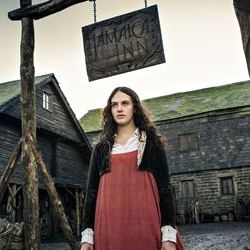You Ought to Get Out More: Jamaica Inn

© Photograph: Robert Viglasky/BBC/Origin Pictures
Theatregoers lead a vampiric lifestyle – emerging in the twilight, dashing to the show and staggering back in the pitch dark to sleep it all off. It’s easy to lose track of events in the wider world. I’ve only just got around to watching the Beeb’s adaptation of Daphne du Maurier’s Jamaica Inn, which attracted over 2,000 complaints about poor audibility.
Television is a medium that allows a more naturalistic approach than theatre – actors are not bound by the need to be heard at the back of the gallery and so can adopt strong accents and even what sounds like poor diction. There is, however, also a difference in the audience.
Watching TV is a largely passive experience. You accept what is shown and have limited options – other than turning the show off- to influence developments. Theatregoing is a much more participative event and the audience is a vital part of proceedings.
It’s hard to imagine that theatregoers would find lines spoken in a method actor mumble to be a complete barrier to comprehension. Sure, it’d be an inconvenience but theatregoers are accustomed to utilising their imagination to fill gaps in productions. This is not a skill that one always utilises willingly.
Anyone living in the regions is accustomed to enduring touring productions that require the use of imagination to pretend the supposedly solid walls of the set aren’t shaking whenever there is a breeze. In the case of a stage production of Jamaica Inn (maybe the book just shouldn’t be dramatised) some years ago the audience had to pretend that the cast, who clearly couldn’t give a toss, weren’t cheerfully moving around after their characters were supposed to be dead.
But part of the fun of attending fringe theatre is the willing suspension of disbelief to accept that the events described in the script are taking place in, say, a castle rather than a room above a pub with absolutely no scenery.
As theatre regularly revives ancient plays or those from different cultures theatregoers have to cope with a range of barriers to comprehension – including outmoded words and phrases. C’mon – does anyone really understand every word that is spoken in a Shakespeare play? When Julian Fellowes recently adapted Romeo and Juliet for the cinema he took the liberty of updating the language to be more understandable to a modern audience. In a manner guaranteed to piss off a fair few people he explained that, as not everyone had the benefit of his standard of education, they could not be expected to understand the play without some translation.
This is, of course, balls. Part of the job of the actor and director is to make sure that plays can be understood without the audience having to consult reference material during the performance. Some years ago Night Light Theatre staged a production of Romeo and Juliet aimed at teenagers.
Director Rich Rusk took the trouble to set the play in an environment with which the young audience was familiar – the inter-family conflict was played out as in a computer game- and demonstrated the different generational attitudes by using puppets to represent the parents. The text was left unaltered resulting in a production that showed Shakespeare could be enjoyed rather than endured.
Which suggests that the TV viewers might have over-reacted and instead of complaining should have treated the mumbled dialogue as one more element in what is, after all, a mystery story. After all, the plot, rather than the dialogue, is the most vital element of Jamaica Inn.
Even if the lines weren’t spoken clearly it isn’t that hard to work out that if a character is shouting and threatening the heroine he is probably a wrong ‘un and just concentrate on working out the twists and turns of the story, As in the theatre the meaning of words, even if they are outmoded or not clearly spoken, can be determined by the tone of voice of the actor and their physical mannerisms. Honesty it’s not that hard – even I can do it.
This does rather suggest that TV viewers really ought to get out more.
– Dave Cunningham










